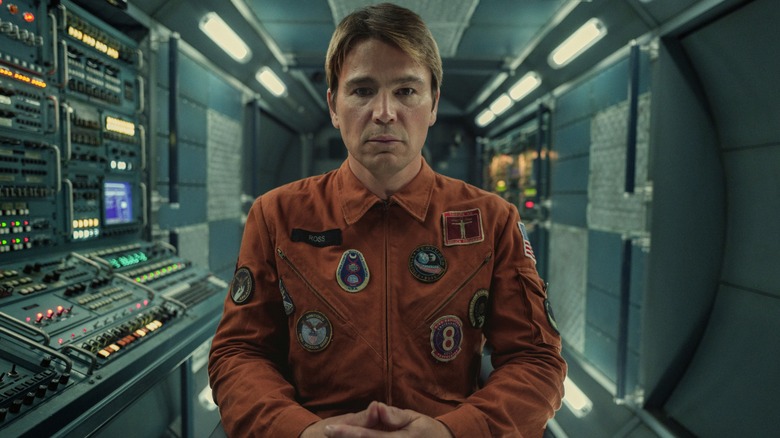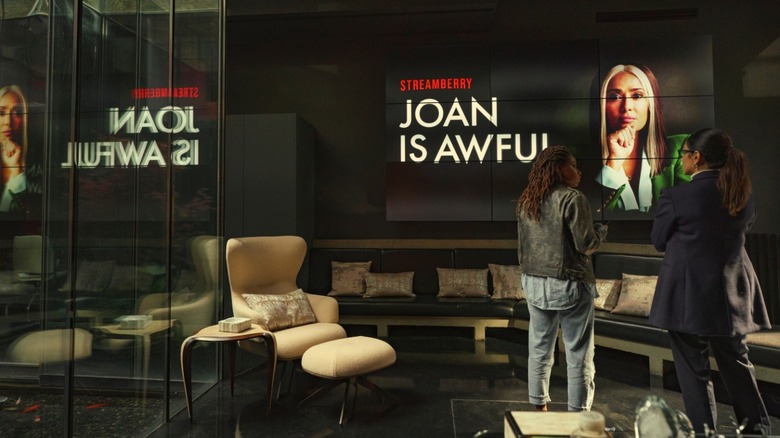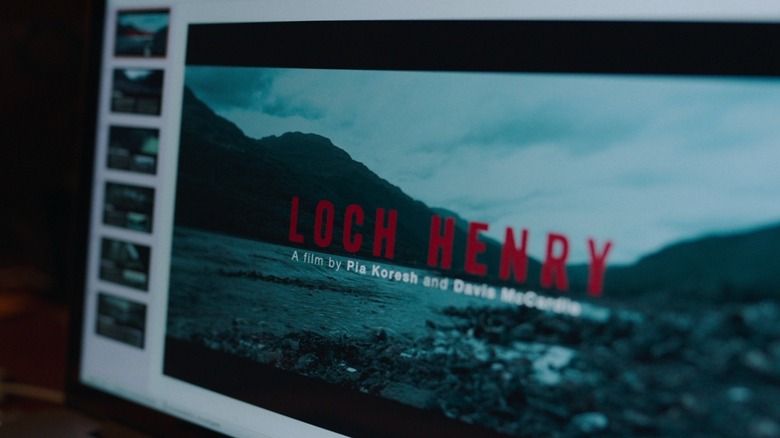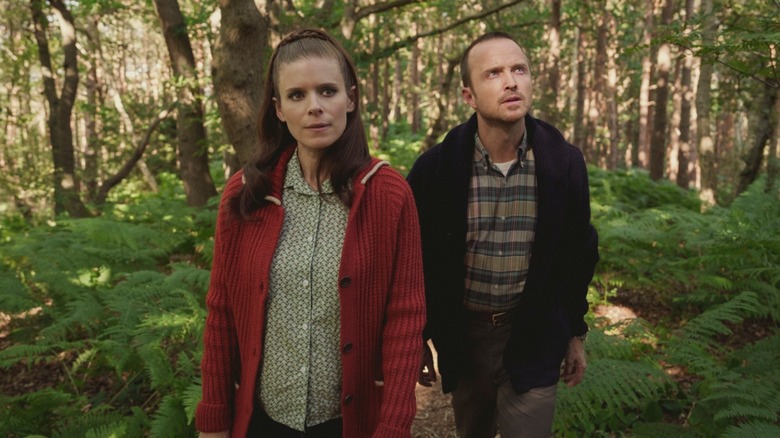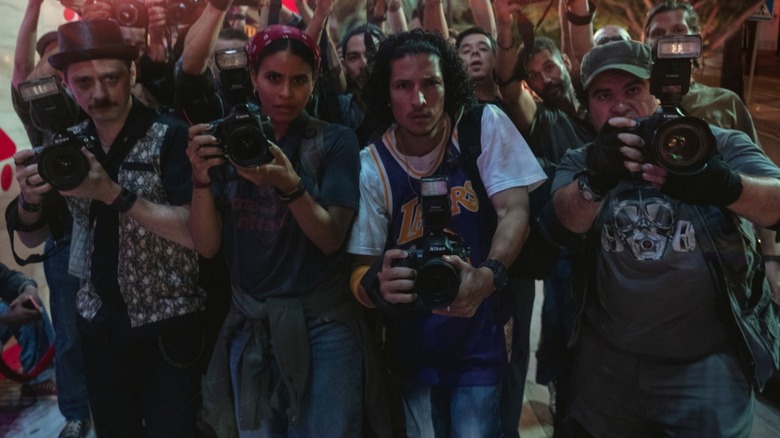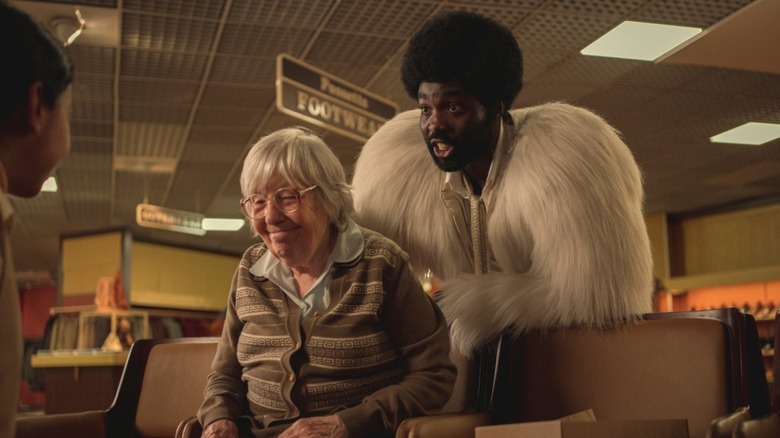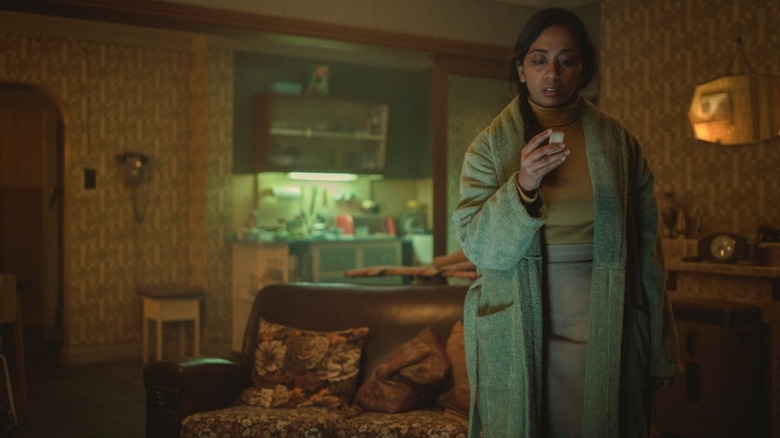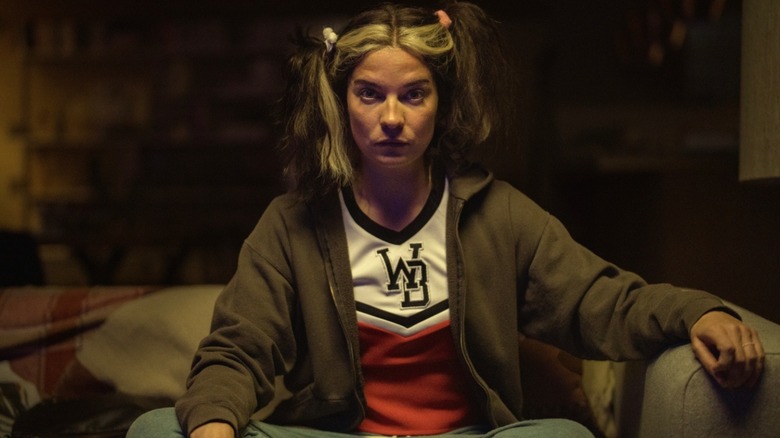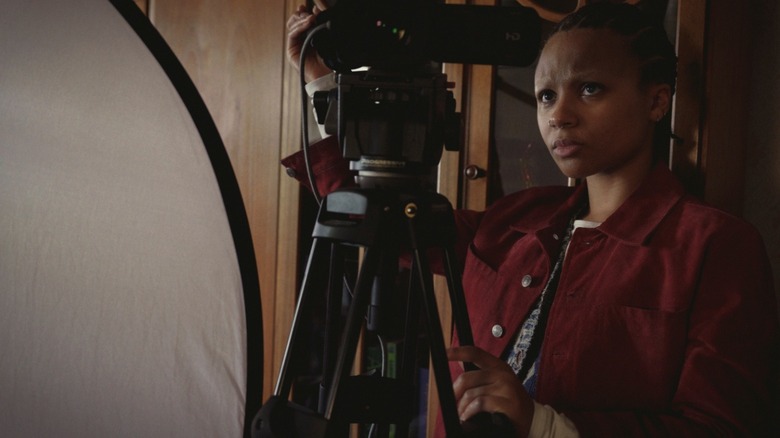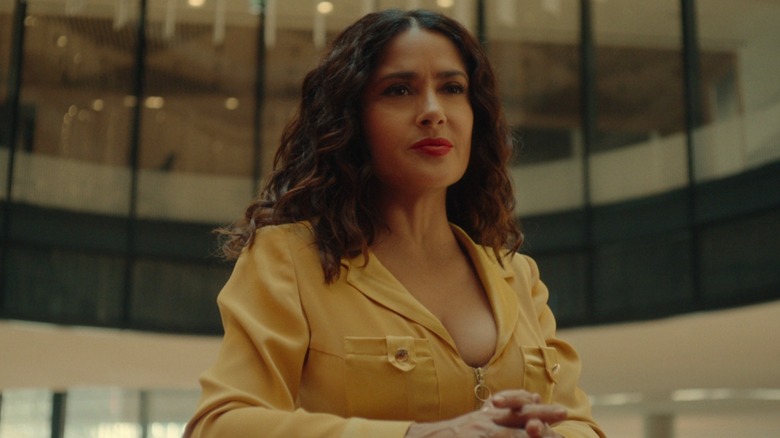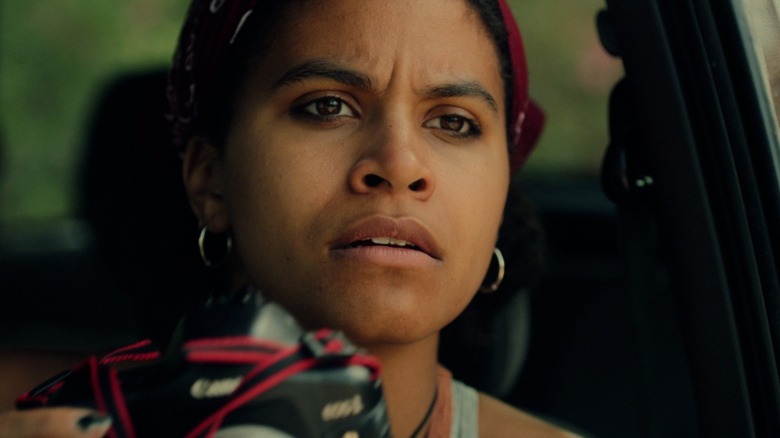Black Mirror: Every Episode's Ending From Season 6 Explained
"Black Mirror" is back, and for fans that have been waiting for a dose of fictional dystopia to briefly distract us from the real dystopia in which we live, it's not a moment too soon. This season has opted to shake things up a bit by taking a slightly less modern view of humanity than what we've seen in prior seasons by starting in the present and delving into an alternate past to tell us stories about what the future may yet still hold. Overflowing with top-notch performances, zany moments, and, of course, a little existential horror to top it all off, this new batch of stories opts to shake things up a bit. That means we have a little bit of explaining to do to settle out some of these twists.
With Season 6 available to watch now on Streamberry — er, we mean, Netflix — and a distinctly experimental tone for some of these new stories, "Black Mirror" seems to be stretching its wings to encapsulate more humor and hope at times, while never drifting too far from the technological angst that has defined the series previously. Dives into the past exist seamlessly alongside modernist AI nightmares, and this season is rife with callbacks. Just to make sure we didn't miss anything, let's go over this one on a case-by-case basis to explain everything that can be explained about "Black Mirror" Season 6.
Joan is Awful
Joan seems to have it all — everything, that is, except control over her own life. A nice apartment, a loving boyfriend, and a position of authority at her workplace, but none of it feels like something she chose. When she is forced to fire a dedicated employee and evades responsibility for it, her morale couldn't be any lower. That is, until she sees a show seemingly targeted directly at her on Streamberry titled "Joan is Awful." Curious at first, and then horrified, she discovers that "Joan is Awful" is based directly on her and her actual life. Joan immediately spirals as she sees all of her worst moments slightly exaggerated for dramatic purposes in the capable hands of the person playing Joan, Salma Hayek. Or, at least, a CGI representation of Salma Hayek.
With the current anxiety around AI and ChatGPT potentially replacing creatives, "Joan is Awful" couldn't have dropped at a better time. Though Joan is forced to learn that she has signed away her likeness to Streamberry simply by signing their massive user agreement when she first subscribed, she teams up with Salma Hayek to get back at the people that have tarnished their images. Storming the Streamberry HQ, this turns into an over-the-top farce with a happy ending by the time the credits roll, but it doesn't reduce the message. By urging Joan to take control of her own life rather than worry about what others expect of her, this is one of the most hopeful episodes of "Black Mirror," as we see the "algorithm machine" destroyed and Joan back in the captain's seat of her reality.
Loch Henry
In and of itself, the world of true crime can feel like a "Black Mirror" episode in which novice journalists with good intentions, a desire for fame, and an unwarranted level of faith in carceral justice contribute to a massively popular genre that is regularly criticized for retraumatizing survivors of violent crime. While there is nuance to the conversation IRL, it isn't nuance that filmmakers Pia and Davis are looking for when they start digging into local lore around Iain Adair. Iaian was a serial killer who lured tourists into his basement to be tortured. He ultimately wounded Davis' father and, according to his mother, Janet, caused health problems that led to Davis' father's eventual death. Yet, things are not all as they seem.
While Davis is in the hospital recovering from a car crash, super-sleuth Pia pulls out one of Janet's VHS tapes labeled "Bergerac," a long-running British crime show from the 1980s focused on particularly unsettling cases. On the tape, instead of an old BBC detective drama, she discovers horrifying footage of Davis' parents torturing a couple to death with Iaian Adair, giving a distinctly "Fred and Rose West" vibe to the couple. Pia attempts to flee but suffers a fatal injury while Janet dies by suicide, leaving the tapes for her son. Though Davis' documentary wins awards, the lens of true crime has been refocused on him. Alone, with the most painful things that have ever happened to him up for public consumption, Davis has gotten what he wanted but paid a terrible price for it.
Beyond the Sea
David and Cliff are astronauts in deep space, with technology that allows them to transport their consciousness into robotic forms back on Earth to help them cope with the lengthy time away. David's family is killed by a cult that is convinced mechanical life is an abomination, leaving him reeling from grief. Cliff and his wife Lana invite David to use Cliff's link for an hour every week to help him cope, although this, of course, gets weird. David develops a crush on Lana, who rejects him, but Cliff's desire to control Lana, their son, and even David's grief process leads to tragedy when David returns to take Cliff's family away, just as he lost his own.
Having it all might make a person feel invincible, but, in the end, we can't control what life takes, and loss can equalize us. Cliff's arrogant belief that he can control the situation blows up in his face and, with his power gone, he and David become true equals for the first time. Though the episode ends on an open-ended note with David kicking a chair to Cliff and inviting him to metaphorically and literally sit at the same table, it's clear that neither has anything left to live for. If they continue on, if they don't, it no longer matters, but whatever they do, they'll have to do it together.
Mazey Day
Set in 2006, "Mazey Day" takes on classic horror genre tropes by matching the hunger of a werewolf with the unscrupulous behavior of mid-aughts paparazzi. Protagonist Bo takes a photo that ruins an actor's life and leads to his death by suicide. While she's told this is not her fault, it forces her to leave the business and work as a barista. That is, until the starlet Mazey Day vanishes off the face of the planet after leaving a film mid-shoot, driving up interest in photos of her. After following her to a rehab clinic, Bo and her fellow photogs are shocked to discover Mazey Day isn't suffering from standard celebrity dramas — rather, she has been transformed into a werewolf.
Though Bo and her peers attempt to flee, the werewolf makes short work of them until Bo is able to get in a single shot that grounds the beast. Bloody, naked, and weeping, Mazey Day begs Bo to kill her, but Bo opts instead to hand her a gun so that she can catch it all on film. With Mazey crying and holding a gun to her head and Bo's finger hovering over the shutter, the parallel between these two very different kinds of "shooting" couldn't be clearer. While this might seem like a departure for the series, the fact is that there is nothing more "Black Mirror" than commentary on the toxicity of paparazzi culture. Indeed, this episode only pulls overarching themes together more than ever by revealing that humanity's various dystopias can't be blamed on technology alone.
If you or anyone you know is having suicidal thoughts, please call the National Suicide Prevention Lifeline by dialing 988 or by calling 1-800-273-TALK (8255).
Demon 79
Taking place in England 1979, "Demon 79" centers on Nida, a South Asian woman working in a shoe store. She's regularly forced to deal with racist aggression and microaggressions alike as her National Front-supporting coworker expresses open resentment toward her and her culture. Nida copes through violent fantasies of destruction and mayhem but leads a relatively quiet and unassuming life. That is, until she accidentally splashes a rune with her own blood, inadvertently summoning the demon Gaap, who takes on the persona of Bobby Farrell — the singer from the novelty disco group Boney M. Gaap tells her that she needs to kill three people to avoid the apocalypse, leading Nida to question her own sanity.
Noting that there is a surplus of truly reprehensible people surrounding Nida, Gaap coaxes her along as she targets who she will kill. A well-meaning policeman stops her just short of her goal, and, well, just as Gaap promised, the apocalypse happens. Still, things aren't all bad as Gaap invites Nida along to endure nothingness with him, implying that it might not be so bad if at least they're not alone. While "Demon 79" is a farce based in nuclear anxiety, late '70s xenophobia, and unaddressed mental health issues, its heart shows us a bleak level of horror that even basically "good" acts might not save us from humanity's worst in the end. While Nida has a relatively happy ending, there is no denying that her time on Earth in this episode is majorly defined by other people's racism, without which neither the murders nor the apocalypse would happen.
Callbacks
This season of "Black Mirror" features several references to past episodes. The most notable of which hinge on its in-universe streaming giant, Streamberry — a stand-in for Netflix itself — from the catchy name down to the flashy logo and user interface. In "Joan is Awful," there is a moment of foreshadowing for the following episode when the documentary "Loch Henry: Truth Will Out" appears alongside a number of other self-referential films and shows. These include documentaries like "Finding Ritman," calling back to the lead antagonist of "Bandersnatch," and "The Callow Years," calling back to the first episode, "The National Anthem."
Besides a handful of other Streamberry in-jokes, there are a few references to the White Bear symbol that first appears in the Season 2 episode of the same name. First, in "Beyond the Sea," the anti-robotics cult members that attack David's family scrawl the symbol in blood on a wall. In "Demon 79," the symbol appears on the rune that Nida finds and accidentally splashes with a drop of her blood. Meanwhile, the TV series "Sea of Tranquility," another recurring "Black Mirror" reference, makes an appearance in both "Joan is Awful," as one of the shows available for streaming, and in "Mazey Day." Bo outs the star of "Sea of Tranquility," Justin Camley, by taking photos of him meeting a lover at a hotel. This isn't nearly all the references to prior episodes to be found in Season 6, and for some fans, part of the fun of "Black Mirror" is trying to catch them all.
Themes
As always, the anthology format of "Black Mirror" explores the interactions between technology and humanity taken to their extremes. This season achieves this by shaking up the timeline a bit more than it has before, implementing just as many nods to modern life as ever while also delving into the past in three of its five episodes. While "Joan is Awful" shows a woman forced to see the immediate echo of everything she does on a TV screen, "Loch Henry" warns of the potential hazards of dredging up the past, followed by three episodes that are trips to the yesteryear of the "Black Mirror" shared universe.
By starting with a tale set so firmly in the present, as many "Black Mirror" episodes are, then using the last episodes to travel backward as the show never has before, this season pointedly refuses nostalgia for any perceived "good old days" before technology came along and ruined everything. Instead, it fleshes out a central theme that technology is essentially benign and it's the hand in which it rests that determines whether it achieves good or ill. Though known for its complex relationship with technology, it's important to note that characters that are against technology run amok, such as the cult in "Beyond the Sea," are completely detached from reality. This adds an overall sense that learning from our mistakes with tech might be a healthier approach than denying its benefits outright.
What has Charlie Brooker said about Season 6?
Although "Black Mirror" relies on a big team to pull it all together, Charlie Brooker is the creator and has remained involved in the series since its early days on the British network Channel 4. As such, his insights on the series are about as close as you can get to the inside scoop on a creative level. In an interview with GQ, he discussed the time jumps of Season 6, noting that dystopias can be a relative concept. He observed, "I'm so old now that I can remember living through other periods, like in the '80s being convinced that I was going to be extinguished at any moment by a nuclear bomb, [watching] public information films about digging a hole in your backyard and waiting to die. That didn't quite happen!"
Much of this season revolves around a slightly more optimistic view that, even in the worst possible outcomes, there is always a silver lining somewhere, just as fulfilling your hopes and dreams can turn into its own curse. Reflecting on current technological concerns for creatives, Brooker said, "With ChatGPT when I first encountered it, I was like, 'Oh my god, that's it, my job done.' But now having toyed with it a bit more, you can see the limitations. There's a generic quality to the art that it pumps out. It'll be undeniably perfect in five years, but at what point it'll replace the human experience? I don't know if that'll ever come."
What has the cast said about Season 6?
While "Black Mirror" is known for its ability to attract both up-and-coming talents and veterans of the acting world, there's no denying that the cast of "Black Mirror" is especially good in Season 6. For "Joan is Awful," relying on the metatextual humor of the story by having actors play exaggerated versions of themselves is all part of the episode's commentary. In an interview with Variety, Salma Hayek explained, "Is this the real me? No, but it was so much fun to play different versions of what people think of me and have a laugh at it and have a sense of humor about it, and then pushing it to the extremes."
For Annie Murphy, trusting the creators was part of signing on. "I got a call saying I got this offer. I didn't hesitate. I didn't care about what the role was or what the episode was. I just wanted to be a part of the show." Similarly, in another interview with Variety, "Demon 79" star Anjana Vasan noted that even the cast doesn't always know the end result of an episode, which invokes a bit of mystery during the filming process. "I got a sense that they were very proud of this season and that it was going to be something a bit different and a bit new, but they were very good at keeping secrets. I didn't know too much until I saw the trailer myself."
Will there be a Season 7?
As of this moment, Netflix has not officially greenlit a Season 7 of "Black Mirror," but considering the ongoing hype around the series, it seems unlikely that the plug will be pulled anytime soon, even with the general acknowledgement that Netflix has been more than a bit trigger happy when it comes to axing hits as of late. Still, the clever twists and compelling characterization of the series take time to perfect, which is why there was a four-year break between Seasons 5 and 6. This is to say that, although we predict more episodes on the way, chances are it could take a while before they're streaming on Netflix.
As far as what Season 7 might entail, while it's likely that recurring themes of technology-gone-wrong and its impact on humanity will show up, the fact is that catching the "Black Mirror" vibe means keeping audiences guessing. To that end, in a recent interview with Tudum, Charlie Brooker made it clear that any season of the series will have to subvert expectations, even if that means subverting his own at times. "I've always felt that Black Mirror should feature stories that are entirely distinct from one another, and keep surprising people — and myself — or else what's the point? It should be a series that can't be easily defined and can keep reinventing itself." With six seasons in the bag, this has been what's kept fans coming back for more.
